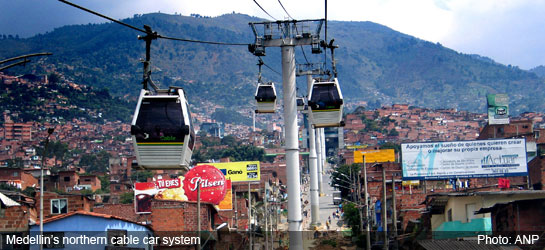
Perhaps the best measure of the charm of Medellín’s Metrocable are the number of joy-riding locals. And it is a rare gondola that empties at the last stop on the circuit. But the innovative public transport system – which can be ridden for the cost of a single metro ticket – has spawned a lot more than hometown fans.
sponsor:
Colombia Travel Agent – Mantaraya Travel
There are the flocking tourists. There are the YouTube videos (including one optimistically titled “Medellin Metrocable – helping end poverty”). And there is the rooftop art: a painted logo of beloved local soccer team Nacional, political musings (example: “Dwarfs would not be dwarfs if they stopped giving stature to the giants”) and fan mail (“Metrocable – the neighborhood’s airplane”).
The system, whose similarity to a ski lift gondola may leave you wondering where you left your snowboard, whisks residents and tourists alike over barrios where few outsiders once dared to tread. Believed to be the world’s only cable-car system intended for mass transit, the Metrocable was part of a former mayor’s effort to bring libraries and transformation to the city’s poorest neighborhoods.
The first route, constructed in 2004, dangles riders over the humble red brick dwellings of Santo Domingo Savio, a slum home to 170,000. Looking back as you ascend, glass walls reveal a wide swath of the Andean valley in which nestles Colombia’s second largest city, an uneven landscape of sharp high rises rising from the shallows between shanty-covered hills.
In front, atop the hill, looms the Parque Biblioteca España, a trio of coal-black buildings designed by Colombian architect Giancarlo Mazzanti to look like an immense outcropping of rock, but easily mistaken for a group of invading spaceships. Inside you’ll find a library, auditorium, Internet rooms, day care center and an art gallery.
What the second Metrocable line lacks in arresting architecture, it makes up for in thrills. The roughly 12-minute ride stretches up over a hill bordering the city, then takes a stunning, precipitous dive into a new valley before making a moderate final climb.
Thrill-seekers should grab a seat in the front of the cabin, while those seeking to avoid vertigo may want look at the retreating hillside, where you’ll see how the other half lives: sheet metal and wood shacks fighting against gravity to stay put.

